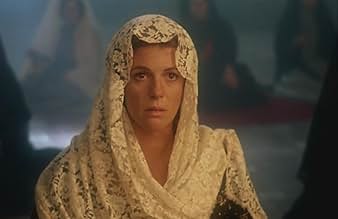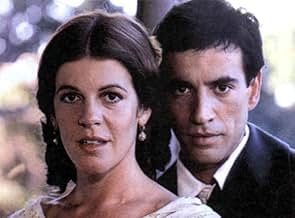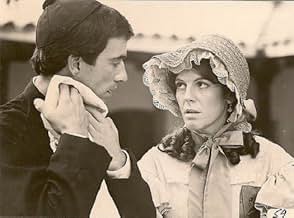NOTE IMDb
6,9/10
1,6 k
MA NOTE
Dans les années 1840 à Buenos Aires, en Argentine, une belle jeune mondaine nommée Camila tombe amoureuse de Ladislao, un prêtre. Après plusieurs tentatives pour combattre ses propres sentim... Tout lireDans les années 1840 à Buenos Aires, en Argentine, une belle jeune mondaine nommée Camila tombe amoureuse de Ladislao, un prêtre. Après plusieurs tentatives pour combattre ses propres sentiments, il succombe finalement à elle.Dans les années 1840 à Buenos Aires, en Argentine, une belle jeune mondaine nommée Camila tombe amoureuse de Ladislao, un prêtre. Après plusieurs tentatives pour combattre ses propres sentiments, il succombe finalement à elle.
- Réalisation
- Scénario
- Casting principal
- Nommé pour 1 Oscar
- 2 victoires et 2 nominations au total
Avis à la une
10syt48-1
"Camila" takes place in Buenos Aires, Argentina (1847-1848) during the tyrannic rule of Governor Juan Manuel de Rosas. The film recounts the tragic true story of Camila O'Gorman, a 19 year old socialite, who falls madly in love and runs away with a young Jesuit Priest, Ladislao Gutierrez. For a few months they were able to live happily as man and wife in a small village near the border of Brazil where they worked as school teachers. Respected by all who knew them, and unaware of their real identity, Camila and Ladislao were eventually recognized by a priest and captured. Imprisoned and executed without a trial by Rosas' orders, their bodies were placed together in a double coffin. At the time of her death Camila was eight months pregnant (but, perhaps due to censorship the film alters that fact) and her execution, along with Ladislao's, prompted the downfall of Rosas' reign.
This is a story that goes beyond doomed love, but also focuses upon personal and political freedom. Susu Pecoraro (Camila), who bares a strong resemblance to the real Camila, and Imanol Arias (Ladislao) are magnificent. This film is a masterpiece!
This is a story that goes beyond doomed love, but also focuses upon personal and political freedom. Susu Pecoraro (Camila), who bares a strong resemblance to the real Camila, and Imanol Arias (Ladislao) are magnificent. This film is a masterpiece!
"Camila" is a love story that is based on true events. It is a unique movie in that it draws the audience to it with the promise of passion, but it keeps the audience intrigued with its historical representation of Rosas' Argentina. The forbidden love affair between Camila, the daughter of a wealthy land owner, and Ladislao, a young priest, is defeated by the intensity of Argentina's patriarchal society. Maria Luisa Bemberg's presentation of the power of Rosas' regime is historically accurate, as is her depiction of the passion and independence of Camila.
"Camila" is a love story set in Colonial Argentina. Camila is a young woman hungry for change and knowledge of the unknown. She meets Ladislao, a young priest whom with she immediately falls in love with. The two decide to escape in order to fulfill their desire for each other. They settle in a remote village but still must face the consequences of their decision. Directed by Maria Luisa Bemberg, "Camila" tells the story of a passionate woman who will fight for what she desires and is willing to sacrifice everything for it. The film is true to the times in which it is based and true to the characters it is based on. Rosas, the dictator at the time, is portrayed in a way that is also true to history. The director Bemberg is also a passionate woman and filmmaker who struggled with censorship in the making of this film, but prevailed. Although it is based on real people, some of the characters are shaped in order to benefit the ideals of the director, but a good film nonetheless. I also recommend "I, the Worst of All" by the same director.
I would recommend this movie for a variety of reasons. Most importantly, it gives a clear impression of what life was like in Argentina at this time. The power that the government, Rosas, had over the people is mind boggling. The fact that a father could be brainwashed enough to choose the government over the life of his own daughter is sickening! This just illustrates the power and backwardness of Rosas' dictatorship. I also enjoyed this movie for the romantic aspect of the story. It kept you in suspense, while you routed for the couple's escape to happiness. The moving ending of the film leaves you with much to think about.
This melodrama directed by Maria Luisa Bemberg is a story of a passionate woman who wants nothing more than to pursue her desire for love and life. The movie shows the audience the importance of the church and social classes and enables us to view the attitudes and emotions of people living during the dictatorship of Juan Manuel de Rosas. However, it is evident that Bemberg has a slight bias in that the movie is seen through the eyes of Camila O'Gorman. This film is a wonderful example of how the movies intend to manipulate the viewer, allowing Camila to have all the rights and giving none to Rosas is rather biased. The film strongly emphasizes the dictatorship of Rosas and the viewer is given the opportunity to see the profundity and power of this dictator.
Le saviez-vous
- AnecdotesThis is the second Argentine film to be nominated for an Academy Award for the 'Best Foreign Language Film' in 1985.
- Citations
Ladislao Gutiérrez: I'm listening, Camila. Talk.
Camila O'Gorman: I'm dying of love, father.
- ConnexionsReferenced in There's Nothing Out There (1991)
Meilleurs choix
Connectez-vous pour évaluer et suivre la liste de favoris afin de recevoir des recommandations personnalisées
- How long is Camila?Alimenté par Alexa
Détails
Contribuer à cette page
Suggérer une modification ou ajouter du contenu manquant

































